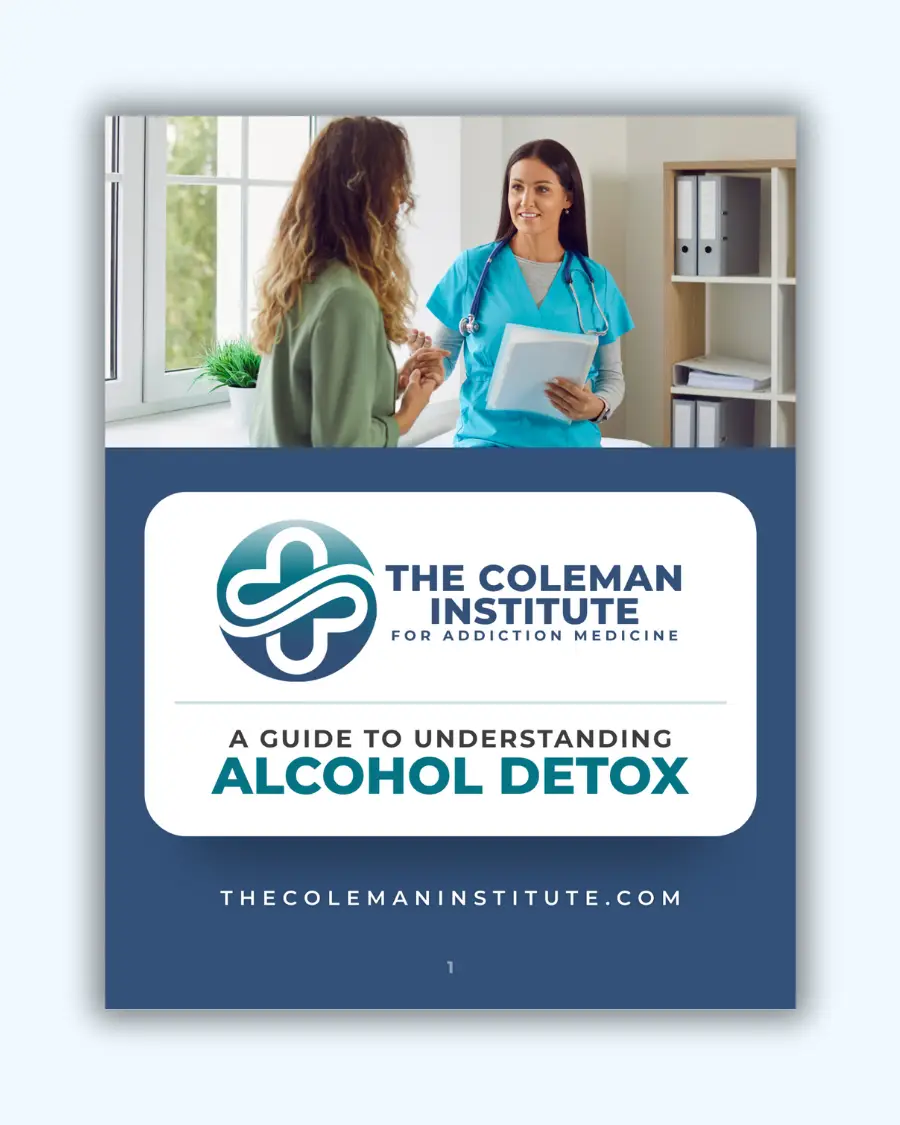Alcohol Detox
The Coleman Method offers a safer and more comfortable option to detox—and commit to your recovery.
Outpatient Alcohol Detox Treatment
Why Choose Outpatient Alcohol Detox?
Although alcohol is a legal and common part of our society, it’s also one of the most addictive and widely abused drugs in the world. In the U.S., 7% of adults have an Alcohol Use Disorder (AUD) and almost 88,000 people die each year from alcohol-related causes — the third largest cause of preventable deaths in the country.
If you’re struggling with alcoholism, you may have tried to cut back or quit on your own. But serious withdrawal symptoms, ranging from uncomfortable to deadly, can make self-detoxing both challenging and risky. At the Coleman Institute, we take these risks seriously and want to treat your addiction as safely and as comfortably as possible. That’s why we’ve developed the Coleman Method, a safe method to restore brain and body function in an outpatient setting.
How Does the Coleman Method For Alcohol Detox Work?
The sustained use of alcohol deprives the brain of crucial nutrients and, when left untreated, can lead to brain damage and seizures. The Coleman Method for alcohol detox begins by replenishing the vitamins and minerals your brain needs, then we offer medication to keep you calm, comfortable, and safe as your blood alcohol level drops. After a few hours of careful monitoring and supervision, you’ll be able to go home. For the next two days, you’ll return to our office regularly as you continue to completely detox.
Once your body is free of alcohol, we offer a comprehensive recovery program in select locations. This includes Naltrexone Therapy to reduce cravings, individual counseling, and/or a regular 12-step program.
Alcohol Use Disorder
How Does Alcohol Use Become an Addiction?
Alcohol is one of the most commonly abused drugs in the United States. This is largely due to the societal acceptance of alcohol use and widespread convenient access to it (grocery stores, restaurants, gas stations, etc). Drinking is entwined in American culture. It is used to celebrate wins, grieve losses, and even as a therapeutic tool for stress, trauma, anxiety, or depression.
Many adults can have a drink or two without developing alcohol dependence. However, when alcohol begins interfering in your daily life, such as straining relationships, making going to work difficult, and impacting finances, it may have progressed into Alcohol Use Disorder.
What Are The Signs Of Alcohol Addiction?
Signs of you or a loved one may be suffering from Alcohol Use Disorder or alcohol dependence can include:
- Drinking more or longer than intended
- Craving or having s strong urge/need to drink
- Drinking interfere with taking care of your family or caused problems at work
- More than once wanted to cut down or stop drinking, or tried to, but couldn’t?
- Continued to drink even though it was causing trouble with your family or friends
- Drinking until the point of blacking out or getting sick
- Spent a lot of time drinking? Or being sick or getting over the after-effects?
- Given up or cut back on activities that were important or interesting to you, or gave you pleasure, in order to drink
- Had to drink much more than you once did to get the effect you want
Facts About Alcohol
Alcohol addiction is a disease. When a person with Alcohol Use Disorder (AUD) stops drinking, there are physiological withdrawal symptoms resulting from the chemical dependence on alcohol. Those suffering from alcohol addiction have an increased risk of poor health. Long-term alcohol use can negatively impact almost every aspect of the human body.
- According to the National Institute on Alcohol Abuse and Alcoholism (NIAAA), an estimated 16 million people in the United States have Alcohol Use Disorder.
- An estimated 88,000 Americans die annually from alcohol-related causes, making alcohol the third leading preventable cause of death in the United States.
- In 2017, 26.4% of people ages 18 or older reported that they engaged in binge drinking in the past month.
- In 2015, 47% of the 78,529 liver disease deaths among individuals ages 12 and older involved alcohol.
- More than 10% of U.S. children live with a parent with alcohol problems according to a 2012 study.
What Are The Symptoms Of Alcohol Withdrawal?
When someone becomes dependent or addicted to alcohol, the brain’s internal wiring changes. Abruptly stopping alcohol use can lead to dangerous withdrawal symptoms. If not managed carefully, alcohol withdrawal can cause seizures, brain damage, and even death.
Navigating alcohol withdrawal symptoms without professional medical assistance can be difficult and risky. Common symptoms of alcohol withdrawal include:
- Headaches
- Tremors
- Anxiety
- Fatigue
- Insomnia
- Gastrointestinal Disturbances
- Heart Palpitations
- Hyperthermia
- Hallucinations
- Seizures
- Mood Changes
Find An Outpatient Detox Near You
The Coleman Institute offers a variety of outpatient detox treatment options at locations nationwide. Our ground-breaking Coleman Method has helped thousands of patients recover from the effects of addiction. Whether you want to detox from opiates or alcohol, we can help.
Featured Alcohol Detox FAQs
See What Other Patients are Saying about Coleman Institute…
Gene – Former Alcohol Patient
“Life is best when you can enjoy it clean and sober”
Ryan – Alcohol Detox Patient
“Using the Coleman Method was the only one that has worked for me for a long period of time.”
Ready to Reclaim Your Life?
Get back to being yourself with our safe and effective method for outpatient alcohol detox.





